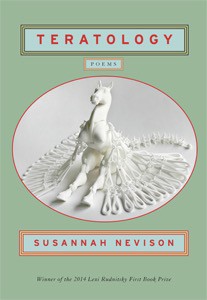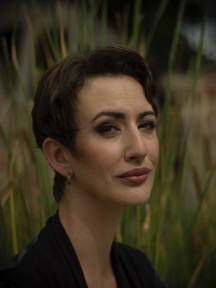 Book Title, Press, Year of Publication:
Book Title, Press, Year of Publication:
Teratology, Persea Books, 2015
Synopsis: The essential unifying themes I kept in mind as I was writing were physical trauma and recovery and the emotional spaces that physical trauma alters: identity, family, desire, loss, grief.
What do you think makes your book (or any book) a “project book”?
I think a project book is always written through a particular lens—it’s a book that demands of its writer (and therefore its reader), a certain obsessive return to the poet’s specific investment, be it landscape, theme, or even a word. I say “lens” because I think project books require a kind of attention that runs the risk of overwhelming the reader and writer, a focus that’s so “zoomed in” that the poet or reader might not be able to find a way out. In other words, a project book is constantly circling the same wound, but a strong project book does so without feeling repetitive. Each poem functions as an adjustment of the lens, as a way to approach the material from a new, and hopefully revelatory, angle.
Why this subject (or constraint)?
I was born with multiple birth defects in my legs and feet, and have undergone around twenty surgical procedures (beginning when I was five-months-old) to correct these issues. I’ve always been trying to make sense of what it means to live in a body that is constantly undergoing revision—and how physical transformation changes not only one’s relationship to the world, but to family and identity. My father was in a terrible accident long before I was born, and also has extensive experience with trauma and surgery. Writing about trauma and recovery became a way for me to explore ways in which our different experiences diverge and overlap, and a way to give voice to bodies that are, in may ways, projects themselves.
Was your project defined before you started writing? To what degree did it develop organically as you added poems?
Toward the end of my M.F.A, I decided to request a copy of my complete medical records. Much of the surgery I underwent happened when I was very young, and although I had a relatively clear idea of what that entailed from conversations with my parents, a lot of the details were hazy. I was in my early twenties at the time, and I wasn’t having surgery, so it was a period of relative stability in that I felt like I had some distance from the records. Reading these records was incredibly difficult and emotional, in ways that I hadn’t anticipated, but it was also incredibly liberating. But medical records are clinical—they don’t speak to what surgery ultimately changes, which is psychological and internal. And so I began to write poems that dealt with what the records can’t speak to, that shift in identity. The earliest poems in Teratology were written in the first few months after reading my own records.
I then put the project aside for about four years. In my late twenties, I underwent several intense surgical procedures and I was laid up for about five months. About two months after the various hardware was removed, I moved to Utah to begin my doctorate. I was still very much recovering when I started to write again, and I wasn’t surprised when many of the poems engaged aspects of the recent surgery. About 80 percent of the poems in the book were written within the first year and half after that surgery—I felt a renewed sense of urgency to get back to the project I had started four years earlier. Of course, the project was wildly different when I started again because I was wildly different. Taking time off was hugely important to the development of the project. I think in many ways it took me four years to distance myself from the records’ specificity, to identify and engage the spaces those records opened up for me.
How important was it for you that each poem could “stand on its own” or that the poems should rely on other poems in the book, or on the premise of the project itself, to succeed? What challenges did this present for you when writing single poems or structuring the book overall?
It’s always extremely important to me that poems can stand on their own. That said, many poems in the book are part of a sequence, or refer explicitly to voices or events in other poems. It’s difficult to write poems that have such self-contained specificity—especially when that specificity involves a kind of ambiguity in terms of consciousness, since many of my poems deal with anesthesia or dreamscape—yet function independent of their companion poems. The challenge was placing these poems for individual publication; seeing if they made sense apart from the project. I’d say maybe half of the book consists of poems that I consider anchors: poems that lay the groundwork, establish what’s at stake, and so on. The anchor poems are the ones I published individually. So long as the more specific or abstract poems had a clear relationship to one of the anchor poems, I felt like they would work within the book, but I was more reluctant to publish them on their own.
At any point did you feel you were including (or were tempted to include) weaker poems in service of the project’s overall needs? This is a risk, and a common critique, of many project books. How did you deal with this?
Of course, I always feel like every poem is a weak poem—the issue was making sure I left enough in to constitute a full-length collection. The book is very lean. With emotionally charged subject matter, and dense poems, I thought less would be best. If a poem was weak, or even somewhat outside the arc of the book, I took it out. There are definitely poems I still consider weaker ones, but since the book is pretty short, my hope is that the weaker poems function as resting places—pieces where readers can catch their breath for a minute. I think poems in the book can be difficult to read because they are so visceral, and creating extra space for the reader to enter and also rest was important to me.
After completing a project, how did you transition into writing something new? What are you working on now? Another project?
After Teratology was selected for publication, I was elated and then terrified. So much of my sense of myself as a writer is tied to that book, and once it was completed I went through a period of post-first-book depression. I didn’t know how to begin, or where to begin, my next project. I was in Montana at the Taft-Nicholson center for a residency with other University of Utah students, and I split my time between revising Teratology and trying to write new poems. It was a disaster, at least in terms of generating new work, but I think I needed some distance from the book before I was ready to begin another project. Lately, I’ve been experimenting with lyric nonfiction and reading a lot, especially about the history of torture and pain (morbid, but important and relevant I think). I’ve been looking through the recently released torture documents from the C.I.A. Like the horrifying photographs from Guantanamo Bay and Abu Grhaib, the C.I.A. documents show the process by which a body can be transformed by wounding—but the wound itself remains covered. The documents are sterile and void of emotion, as if to detail torture must necessarily divorce cause from effect. The effect is implied but never visually shown. To come closer to the essence of pain that these documents mask, I want to move closer to the wound that language covers up. I’m interested in engaging the documents themselves—through the creation of poetry that attempts to move away from sterilized language that masks meaning—to somehow uncover the linguistic wound that those infamous photographs render visible.
What advice can you offer other writers, particularly emerging writers or poetry students who may be using the project book as a guiding principle for their own work?
Let the project find its own weird way. Don’t push too hard to make everything “fit” neatly together—you sometimes have to get off-track in a major way, and I mean write poems (as in, a lot of poems!) that perhaps constitute an entirely different manuscript, in order to figure out what the project wants. In other words, trust that the project will voice its own demands over time, and then listen to it. That sounds way more cryptic than I intended, but I do think letting the work instruct you is essential.


